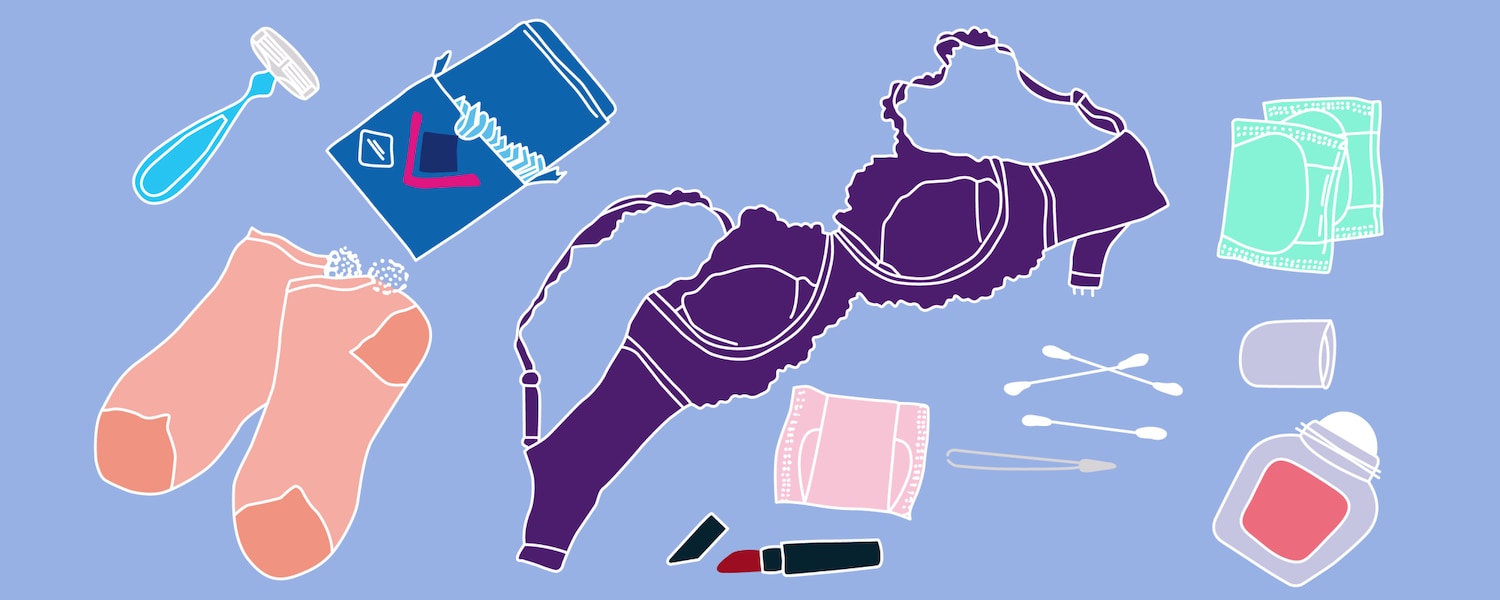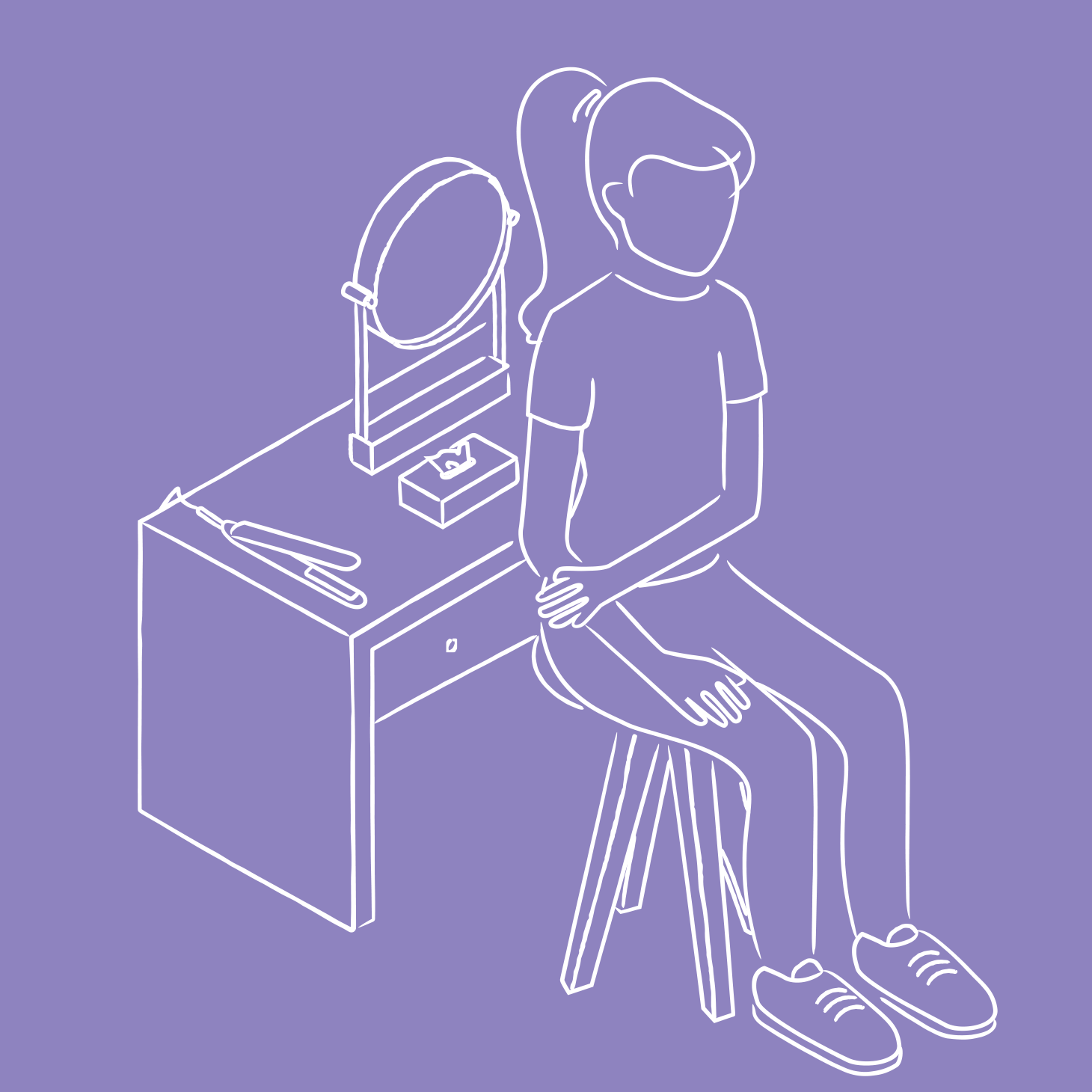
Puberty Signs and Stages for Girls

Am I normal? First off, it’s all natural. Puberty in girls starts when changes in your brain trigger the release of hormones in your ovaries.
Some say it's the transition from childhood to adulthood, which is a nice way of saying your body is likely to change shape, your moods may ride a roller-coaster, and you’ll become more aware of who you are as a person.
Whether you end up becoming a mum one day or not, it’s your body’s way of making you able to have babies. As a result, you’ll probably experience more intense sexual feelings for others and you might start masturbating.
When do girls start puberty?
Puberty can begin from about the age of 8, up to about the age of 14.1 So don’t worry if you’re late to the party or one of the first of your friends to experience puberty; everybody’s body is different so it’s completely normal to go through puberty at different times. Plus everyone goes through puberty at some point – there’s no avoiding it!
During puberty, the sex hormone oestrogen is produced and as a result your body will experience some physical and mental changes.2 Some of these changes may sound scary but they are absolutely nothing to be worried about – it just means you’re growing up!

What are some of the first signs of puberty?
Your breasts will get bigger
During puberty, your breasts will start to develop and get bigger. Throughout this process; they may feel a bit sore and/or itchy – but don’t worry, this just means they’re growing. Remember, there’s no real way to predict what your boobs will look like or how much they’ll grow – just like we never entirely know how tall we’ll be or what shoe size we’ll end up with! It’s best to try not to compare yourself with other people as ultimately, every one of us is unique before, during and after puberty.
You will develop pubic hair
You’ll also spot some pretty big developments in your V–Zone. This is the area of skin running from just below your belly button to between your thighs, that’s roughly in the shape of a V. Most likely, there will be pubic hair there – this will be thicker and coarser than the rest of the hair on your body. This physical transition may seem strange at first but your pubic hair is there to reduce friction, so that your intimate skin doesn’t become irritated.
You may produce vaginal discharge
You may have also noticed a small amount of discharge come out of your vagina – a clear or creamy liquid with a very slight smell. Don’t worry, this is all totally normal and is something that every girl will experience. Discharge is simply your body’s way of keeping your cervix clean and your vagina moist; which helps prevent infection.
Your period will start
Another thing to look out for, of course, is your period. First periods are often light, perhaps just a small amount of blood, known as spotting, or it might be very dark, almost brown. This can happen in a very random way to start with, so you won’t get a clear or predictable pattern to your menstrual cycle right away. Again, this is nothing to worry about, and your periods will eventually settle into a regular routine.
You may experience mood changes
While it might feel abnormal to cry one minute and crack up with laughter the next, mood swings are totally normal. During puberty, your brain chemistry is changing by creating new cells and working out new ways of thinking.
Your emotions may feel like you’re on a merry-go-round that you can’t get off. Make sure you take the time to talk to people you’re comfortable confiding in, and remember your mum/sister/aunt went through it herself, so she’ll understand.

Which Period Pants Are Right for You?
When does puberty end for girls?
As with every process that your body goes through, there will never be a specific date for when it will start or end. However, puberty does tend to end about 4 years after it started – but this could be a little more or less depending on your body.3 Remember to try not to focus on timings too much, instead relax and allow your body the time it needs to go through puberty.
Keeping your V-zone hygienic during puberty
Having pubic hair and discharge means your V-Zone will smell stronger than before, because sweat and bacteria can quickly accumulate in such a warm and damp area. This means a good intimate hygiene routine is really important. Shower daily and wear clean clothes and ‘breathable’ cotton underwear, and you’ll always smell fresh and feel comfortable. And once you start your periods, change your period product frequently, and use intimate wipes to keep yourself clean.
The vagina is self-cleansing so there’s no need to wash inside it (known as ‘douching’). In fact, this can lead to conditions like thrush or bacterial vaginosis, so avoid doing this. You may also find that perfumed soaps, shower gels and bubble baths make your vagina sore, so use an unperfumed soap or an intimate wash.
To keep yourself clean and comfortable, wipe and dry your V-zone after each toilet visit, using soft toilet tissue. You may also want to wear a liner every day, to keep your V-Zone fresh and protect your underwear.
Who can I talk to about puberty?
‘I think I smell bad’, ‘Why am I always angry’ or ‘Why are my nipples sore?’. No question is too dumb or too weird when it comes to puberty, and you won’t be the first (or last) person to have asked.
Choose someone you trust – your mum, your dad, your best friend, a relative who’s been where you are. The help you’ll find from talking about your worries, however big or small, will be totally worth it.
From the serious to the hilarious, sharing goes a long way in making you feel better. There are also books and videos on YouTube to help if you’re not ready to talk yet. There’s always the option of writing a note and putting it under a parent’s bedroom door, if you want to share stuff but feel too embarrassed to say it face-to-face. And remember, we’re here to help you through all the highs and lows.
So although puberty is just something we all go through at some point, it’s definitely a big change which can be challenging at times. But there’s no need to worry about it as it’s just part of growing up! Remember you can always confide in close relatives or friends if you’re worried about anything because they will have all gone through it too and be able to help.
Now you’re here, why not find out more about puberty and read some of other great articles on how to handle puberty in a few simple steps and teenage brain development.
References
1https://www.nhs.uk/live-well/sexual-health/stages-of-puberty-what-happens-to-boys-and-girls/
2https://www.childline.org.uk/info-advice/you-your-body/puberty/puberty-girls/
3https://www.nhs.uk/live-well/sexual-health/stages-of-puberty-what-happens-to-boys-and-girls/
Continue learning
Explore more




